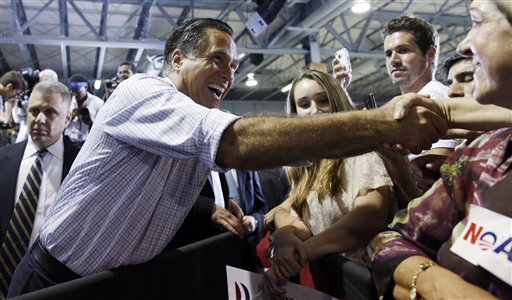NEW YORK — After this, politicians everywhere should surely get the message. Mitt Romney’s secretly recorded remarks at a Florida fundraiser – and the uproar that has followed – reinforce a key reality of the digital media era: the power of viral video to disrupt and potentially alter a high-stakes political contest.
The amateur video of Romney casting 47 percent of Americans as believing they are “victims” who feel entitled to government assistance has burned up the Internet and aired continually on cable television since its release Monday by Mother Jones magazine. It’s thrown his campaign off track in a tight race with President Barack Obama and with less than seven weeks until Election Day.
Mother Jones has not disclosed who recorded the remarks. A spokeswoman said that by Wednesday afternoon, the full video and a series of clips had received 5 million page views on the magazine’s website and 3 million more views on YouTube.
In a presidential race noteworthy for the intensity of its televised advertising — Obama, Romney and their allies are on track to spend about $1.1 billion on campaign commercials this year — the impact of the leaked video has been particularly stark.
While both sides have deployed scores of highly produced ads aimed at swaying a small group of undecided voters in a handful of battleground states, the decidedly low-tech Romney video has done far more than any one commercial to sway the national political conversation.
There’s no doubt campaigns will continue to rely on TV ads as an important component of their communications strategy. But they also can’t ignore the proliferation of camera-equipped smartphones and amateur videographers eager to capture candidates in unvarnished and potentially revealing situations.
“It’s the democratization of information. One video can offset millions of dollars in campaign ads,” said Darrell West, director of the Center for Technology Innovation at the Brookings Institution in Washington. “The Internet is now the great equalizer — videos can go viral and be seen by millions of people for free.”
Amateur videos have played a significant role in international incidents. In Iran, bystanders captured the shooting death of a woman named Neda Agha Soltan during protests against that country’s disputed presidential election in 2009. The video circulated widely online and in social media, becoming one of the enduring symbols of the clash between government forces and pro-democracy activists.
While not shot by amateurs, the trailer for the anti-Islam movie “Innocence of Muslims” also showed the powerful combination of moving images and the far-reaching Internet. The film has been linked to an outburst of violent protests in the Middle East and controversy in other parts of the world.
In the U.S. in 2006, Sen. George Allen, R-Va., was captured on video referring to a mixed-race Democratic campaign videographer as “macaca.” The term is considered a racial slur in some countries, but Allen at the time said he meant no racial intent. Footage of the encounter went viral online, forcing Allen on the defensive in the closing weeks of the campaign. He narrowly lost re-election to Democrat Jim Webb and is now running for the seat again.
Obama, too, has been scorched by amateur recordings. In 2008, at a San Francisco fundraiser, Obama was caught on tape suggesting “bitter” small-town voters “cling to their guns or religion or antipathy toward people who are not like them.” The remarks were recorded by an Obama campaign donor who doubled as a citizen journalist for The Huffington Post. The episode helped reinforce skepticism about Obama among many white working-class voters that polls show persists to this day.
Republicans have tried to turn the tables on Obama since the Romney fundraising video surfaced, pointing to an audio recording from 1998 in which Obama, then an Illinois state senator, seems to endorse income redistribution “at least to a certain level to make sure everybody’s got a shot.” The Republican National Committee released a Web video using Obama’s comments, and Romney mentioned them at a fundraiser Wednesday, saying Obama “really believes in what I’ll call a government-centered society.”
It was unclear whether that pushback could mitigate any damage done to Romney’s campaign by the “47 percent” video, which reinforced through the candidate’s own words the Obama campaign ads depicting Romney as a rich businessman unconcerned with the middle class.
“He’s reinforcing the stereotype as someone who doesn’t get the plight of ordinary Americans and appears indifferent to them,” the Brookings Institution’s West said. “If you didn’t have the early framing of Romney, the video wouldn’t be so devastating. It’s the one-two punch of the Obama ads and this video that are deadly.”
Several Republican lawmakers have already distanced themselves from Romney’s remarks, and the candidate himself described them as “inelegant” at a hastily convened news conference just hours after the video surfaced. Romney’s running mate, Paul Ryan, said Wednesday that Romney had been “obviously inarticulate.”
The emergence of viral video has led some political observers to speculate that campaigns will become even more carefully packaged than ever before and that nervous politicians fearing the presence of a secret camera phone will cease saying anything spontaneous, no matter what the audience.
But Rodell Mollineau, president of the pro-Obama group American Bridge, said candidates who did not try to say different things to different audiences had nothing to fear from secret taping. American Bridge assigns video “trackers” to Republican candidates, hoping to catch them in a potentially damaging unscripted moment.
“You can get a gotcha moment. Those happen. But more than anything you find inconsistencies in people’s rhetoric,” Mollineau said. “Politicians will still try to say one thing to one group of people and one thing to another group of people. It won’t work anymore.”
Send questions/comments to the editors.


